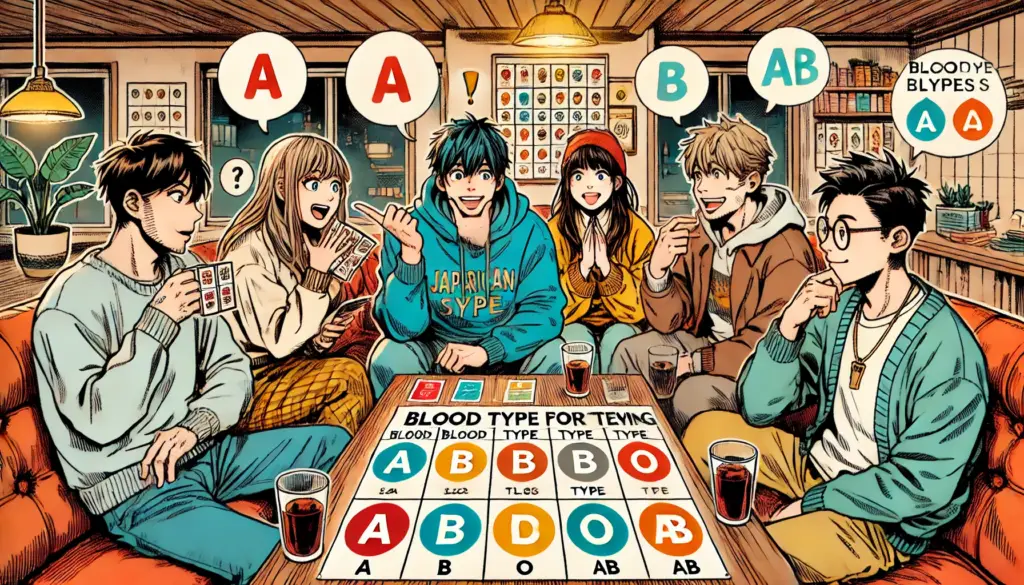
For decades, blood type fortune-telling was a cultural phenomenon in Japan. Many people once believed that your blood type could reveal your personality, compatibility, and even predict your future. Magazines ran columns, television shows hosted discussions, and even companies allegedly considered blood type in team assignments or hiring.
Yet, in recent years, this once-dominant cultural trend has nearly vanished. Younger generations rarely talk about blood types anymore, and many now see it as an outdated or even problematic belief. Instead, Japan has embraced new forms of personality analysis, especially digital-based assessments and global psychological frameworks.
So, why did blood type fortune-telling fade away? And what replaced it in modern Japanese society? Let’s dive in.
The Rise of Blood Type Fortune-Telling in Japan
The popularity of blood type fortune-telling can be traced back to the 1970s. Books by Nomi Masahiko claimed a connection between blood type and personality. According to this belief:
- Type A: Serious, responsible, perfectionist
- Type B: Creative, free-spirited, sometimes selfish
- Type O: Confident, sociable, natural leaders
- Type AB: Complex, mysterious, dual personalities
These simple categories fascinated the public. In a society where group harmony was highly valued, blood type fortune-telling offered a way to explain human relationships and social compatibility.
By the 1980s and 1990s, blood type columns became a mainstream feature in women’s magazines, TV talk shows, and matchmaking services. Children would even ask each other’s blood type at school, similar to how children in other countries ask about zodiac signs.
The Problems That Led to Its Decline
Despite its popularity, blood type fortune-telling eventually faced backlash. Several key factors explain why it lost cultural relevance:
1. Lack of Scientific Basis
Researchers repeatedly pointed out that there was no proven correlation between blood type and personality. Unlike astrology or other forms of divination, blood type fortune-telling claimed to be “scientific,” but evidence was missing. Over time, younger generations became more skeptical of pseudoscience.
2. Discrimination Issues (“Bura-hara”)
The trend sometimes led to blood type harassment (bura-hara). For example, Type B people were stereotyped as selfish, while Type A people were seen as inflexible. In workplaces, there were even reports of managers assigning roles based on blood type. This raised concerns about discrimination, echoing broader debates on stereotypes in society.
3. Generational Shift in Values
Millennials and Gen Z in Japan grew up in a globalized, digital-first environment. Instead of simple categories like blood type, they looked for more nuanced, psychological frameworks. The internet also made it easier to fact-check, and interest shifted toward new personality tests from abroad.
4. Media Evolution
Magazines and TV once played a huge role in pushing blood type fortune-telling. But with the decline of print magazines and the rise of digital platforms, the cultural pipeline that spread these ideas weakened. Social media shifted focus toward quizzes, memes, and personality content with global appeal.
What Has Replaced Blood Type Fortune-Telling?
While blood type fortune-telling has largely disappeared, Japan hasn’t abandoned personality tests altogether. In fact, new forms of fortune-telling and personality analysis are thriving, especially on social media and apps.
1. MBTI (Myers-Briggs Type Indicator)
The MBTI personality test has exploded in popularity in Japan, especially among Gen Z.
- Originating in the U.S., MBTI categorizes people into 16 personality types based on four dichotomies: Introversion/Extraversion, Sensing/Intuition, Thinking/Feeling, and Judging/Perceiving.
- TikTok, Instagram, and YouTube have popularized MBTI memes, with Japanese influencers explaining types like INFJ “the Advocate” or ENTP “the Debater.”
- Young Japanese see MBTI as more “global” and “rational” than blood type fortune-telling.
2. Enneagram
The Enneagram, which divides personalities into nine core types, has also gained traction. It’s especially popular among people interested in self-improvement and mental health.
3. Character-Themed Personality Tests
In Japan, quizzes often take playful forms. For example:
- “Which Pokémon are you based on your personality?”
- “Which Ghibli character matches your traits?”
These quizzes combine entertainment with personality analysis, fitting perfectly with social media culture.
4. Astrology Comeback
Interestingly, while blood type fortune-telling declined, Western astrology has made a comeback in Japan. Horoscopes and zodiac-based apps are popular among young women, who see them as trendy and fashionable.
Why These New Trends Appeal to Young Japanese
The success of MBTI, Enneagram, and character-based quizzes reflects deeper social changes:
- Globalization 🌍 – Japanese youth feel more connected to global pop culture and psychology frameworks.
- Digital Platforms 📱 – Online quizzes spread faster than traditional TV-based fortune-telling.
- Personal Identity Exploration 🔍 – Younger generations want tools for self-reflection, not just stereotypes.
- Community and Memes 😂 – Sharing MBTI memes or character-based results creates easy conversation starters on social media.
In short, the new personality tests are more interactive, customizable, and socially engaging than the rigid categories of blood type fortune-telling.
A Reflection of Japan’s Changing Culture
The fall of blood type fortune-telling and the rise of MBTI highlight a broader cultural shift in Japan:
- From group-based stereotypes → to individual identity exploration
- From pseudoscience in magazines → to interactive digital quizzes
- From domestic cultural trends → to globalized frameworks
Blood type fortune-telling once reflected a society where conformity and harmony were key values. Today’s MBTI boom reflects a generation seeking individuality, personal growth, and a sense of belonging in a global community.
Conclusion
Blood type fortune-telling may have disappeared from Japanese mainstream culture, but the fascination with personality and destiny is far from gone. Instead, Japan has embraced new global frameworks like MBTI, playful character quizzes, and even a revival of astrology.
What has changed is the context: rather than being used for rigid stereotypes or workplace assignments, personality tests are now tools for self-expression, entertainment, and social bonding.
In other words, while blood type fortune-telling faded away, Japan’s love for understanding personality simply transformed into new, digital-friendly forms. And just like before, these trends say as much about Japanese society as they do about individual identity.



















































